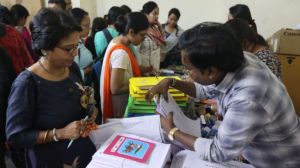Tipping Point Balochistan?
The victory of democratic forces in Pakistan8217;s recent elections has put the crucial debate on Centre-provinces relations back on the table.

The victory of democratic forces in Pakistan8217;s recent elections has put the crucial debate on Centre-provinces relations back on the table. The apology offered by the PPP co-chairman Asif Ali Zardari on February 24 on behalf of all Pakistanis to the people of Balochistan has added a new twist to the tale. The struggle for provincial autonomy and utilisation of natural resources triggered the Baloch resistance against 8216;exploitation by the central government8217;. Ashfaq Saleem Mirza tracks the contours of the crisis and assesses the implications of the PPP8217;s apology
8226; What is the history of Baloch resistance in a nutshell?
The history of Baloch resistance since the first agreement between the British and the Khan of Kalat, Mehraab Khan, in 1839 frames the same pattern of resistance and submission. A major factor in this situation since the time of British suzerainty over Balochistan has been the effort to keep the status quo knitted around the privileges of the Baloch sardars.
After joining Pakistan in 1948, the Baloch people have confronted the government on five occasions. They feel the government of Pakistan has violated the agreement between Mohammad Ali Jinnah and the Khan of Kalat. According to them, their autonomy is based on the memorandum presented by Jinnah to the Cabinet Mission, in which it was stated that according to an agreement of 1876 with the British, Kalat was an independent state. The speech of the then secretary general of the Kalat State National Party, Mir Ghaus Bux Bizenjo, buttressed this in 1947 when he emphasised the separate identity, ethnicity, culture and nationhood of the Baloch people.
8226; What was Z.A. Bhutto8217;s role in the insurgency when it first began?
Bhutto, in the early 1970s, wanted socio-economic changes in the structure of the Baloch polity but he could not execute the intent appropriately. The situation was aggravated when the elected government of the National Awami Party in Balochistan was dissolved by the Centre. The
sardars opposed any change in the status quo and prepared to resist Bhutto8217;s proclamation against the sardari system.
8226; How did the insurgency and the counter-insurgency play out?
Baloch nationalists finally took up arms in 1973 and clashed with federal forces. The fight heightened in 1974. Young leftists from Sindh and Punjab 8212; some of them students abroad 8212; also sided with the Baloch nationalists. According to Selig Harrison, former journalist and director of the Asia Programme at the Woodrow Wilson International Centre for Scholars, the Baloch upheaval consumed the lives of 5,300 Balochis and 3,300 Pakistani armymen.
8226; What are the main grievances of the Baloch people?
They feel other provinces have no right to exploit Balochistan8217;s natural resources. They are unhappy about the system of distribution of natural gas from their province to the rest of Pakistan. They also oppose the establishment of army cantonments at Kohlu, Dera Bugti and Gwadar. They demand the withdrawal of Frontier Constabulary from Balochistan. Their other big grudge is the inadequate representation of Balochis in the government machinery. They also resent the construction of the Gwadar port, investment by MNCs and China8217;s keen interest in development of Balochistan.
Basically, these grievances arise from the demands of the sardars who want to maintain the sardari system with the privileges they were enjoying under the Sandeman system of 1876. They perceive development in tribal areas as infringement of their authority. There is confusion about the polarisation of forces in Balochistan. The Human Rights Commission of Pakistan and other NGOs are of the view that the Balochis are oppressed by Islamabad. But they forget the class divisions in tribal society and the despotic character of the sardari system.
8226; What are the implications of Zardari8217;s apology? Why did he tender the apology now? Is the timing crucial?
After joining hands with the PMLN and ANP, Zardari deems it imperative to make a broad-based alliance to establish a democratic order in Pakistan. The apology to the Baloch people is the first step towards this.
8226; Are the Baloch people willing to join hands with the PPP, a party they consider to be an elitist, Sindhi party?
It is too early to gauge the reaction of the Balochis towards this gesture of friendship by the PPP because they have a bitter experience from various agreements in the past. Being a Balochi himself, the hand of friendship extended by Zardari in the capacity of PPP8217;s co-chairman is an interesting move. Rather, it is an unprecedented move. The sustainability of the friendship, however, remains to be seen. The change can only be effected if the Baloch middle class and educated youth support progressive opinion.
The writer is an Islamabad-based social scientist Ashfaq_saleemhotmail.com
- 01
- 02
- 03
- 04
- 05































